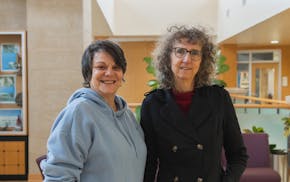Davu Seru sat in a St. Paul coffee shop and quietly proclaimed, "2017 will be the year of the No Territory Band."
It was heartening to hear Seru lay down his marker. For the past 16 years, the 38-year-old drummer/composer has been a linchpin, mentor and abiding presence on the Twin Cities jazz scene. He has curated three monthly music series and performed in just about every genre and setting imaginable. He has solid contacts in France and often tours in Europe with the SDS trio. Home and abroad, his versatility on the bandstand adds another dimension to the word "diversity."
But now, with his No Territory Band — a meticulously chosen ensemble playing the ambitious material he writes — Seru is concentrating on music that captures the unique breadth and vision of his own life experiences.
Near the end of the long bio on his website, Seru refers to himself as a "celebrated local black," an acknowledgment that he has spent most of his life feeling like a broken-field runner in a minefield of race and class stereotypes and realities. With the No Territory Band, he sheds that cynicism and goes where his music takes him. The squawks, silences and knotty time signatures usually associated with art-house music get a big boost from the staccato funk of hip-hop and the circular rhythms of Ghana, all underpinned by the blues.
Seru is a fundamentally self-taught musician. Born in the Sumner projects of north Minneapolis to a 16-year-old mother who split from Seru's father within a year, he grew up with a drum set bought by his stepfather — "a small-time drug peddler," Seru said — when Davu was 7 years old.
His music and his soul are rooted in the blues. He frequently cites his ancestors as "blues people" from rural Iowa, and loves dropping a gospel-inflected country-blues tune such as "Dark Was the Night" by Blind Willie Johnson into his monthly duets with guitarist Dean Magraw at St. Paul's Black Dog Café.
His style is also informed by the funk and hip-hop he heard erupting from his boombox on Minneapolis radio station KMOJ in the 1980s and early '90s, when his crew at North High wore military fatigues like the rap group Public Enemy.
But the more refined arts were equally seductive. While Seru was devouring music, he earned a bachelor's degree in African-American literature and a master's in English from the University of Minnesota, where he is now a professor of African-American literature and culture. Growing up, he was bedazzled by Picasso. In literature, he speaks of the black nationalism of Amiri Baraka and the Southern gothic of William Faulkner as kindred touchstones.
And then there is renegade jazz composer Anthony Braxton. Braxton is regarded by many as a musical genius, a composer/saxophonist who synthesized jazz and classical traditions into his own pretzel logic — even his song titles resemble doodled geometric equations — creating dauntingly idiosyncratic music of depth and mischief. Just out of his teens, Seru was hooked, to the point of copying Braxton's sartorial emphasis on cardigan sweaters.
At the turn of the century, a 19-year-old Seru went down to Chicago to live for a year and glean the wisdom of the Association for the Advancement of Creative Musicians, the avant-garde collective where Braxton got his start in the 1960s.
A few years later, another right-to-the-source tutorial took him to Ghana to study at Bernard Woma's Dagara School of Music — his only formal training besides a trimester of band in junior high.
But the deepest part of his résumé concerns the realm of "free jazz." Seru has recorded numerous albums with seminal local free-jazzer Milo Fine. And he has curated various jazz series over the years, always with an emphasis on intuitive and improvisational interplay. (He currently curates the Thursday night series for Khyber Pass Café.)
Now Seru is pouring these experiences into No Territory, raising money for a recording while workshopping the music in a very public manner at venues around town. Want to hear how Seru is forging musical artistry from personal history and his distinct set of influences? The next showcase will be at Reverie in Minneapolis on April 13. Or you can listen to a demo on his website.
"I think it has legs," he said of the group in a rare moment of self-congratulation. "It is all acoustic. I want to affirm jazz as improvised music, as folk music. But there has to be elasticity, to be able to breathe in real time."
'Dead King Mother'
If 2017 is the year of the No Territory Band, 2018 is already shaping up to be Seru's time for "Dead King Mother."
On April 4, 1968, the day the Rev. Martin Luther King was assassinated, a man named Clarence C. Underwood stood before his family in the projects of north Minneapolis and announced he was going to kill the first white man he saw. And he did. He shot a white man in the head three times as the man was getting off a bus after a day's work.
When police arrived, Underwood pleaded with them to shoot him, saying "they killed my King." But he was arrested, convicted and sent to Stillwater instead.
Davu Seru, nee David Underwood, who was born more than a decade later, heard the stories about his great-uncle Clarence while growing up in the same projects. "He got out of prison when I was a kid," said Seru. "I remember seeing him on the streets."
Seru has begun writing what he calls a "blues for chamber ensemble" about the incident and its ramifications. He will explore the project as the inaugural Studio Z composer-in-residence, working with the intrepid chamber jazz group Zeitgeist, with support from a Minnesota State Arts Board grant.
Seru was describing a lyric he wrote for the piece, in which Underwood's wife demands to know, "Weren't me and the children your people, too?"
Then he paused.
"This stuff is tricky," he finally said. "We sell stories of ourselves, typically stories of impoverishment. And foundations address historical guilt by funding these projects that have a jolting and empowering theme. I try to be conscious of that, to remain black and be personal while risking the failure that this will just be some Black History Month thing."
For its February 2018 premiere, Seru hopes to involve elders from the black community who were around at the time of the incident. Another project that is part of his Studio Z residence, "Scratch Music Year," will bring together "trained" and "untrained" artists. And he will curate concerts that reflect his diverse contacts and tastes.
Whether it is a curse or a compliment, Seru is well equipped to bruit issues of race and class within the passive-aggressive confines of Minnesota Nice. Because, fortunately or unfortunately, he can't help himself from being Black History Month material.
"Not long after I met him, I thought, 'Where was that guy when I was trying to learn how to behave as a human being?' " said Magraw, who is 25 years Seru's senior. "He came from poverty and pulled himself out by staying true to his love of art and music. He's dynamic, unpredictable, plays and lives with joy. It's inspirational."
Britt Robson is a Minneapolis freelance writer.

Yuen: Why do people forgive? It's messy, complex and 'the best form of self-interest'
How the Goo Goo Dolls learned the music biz from Minneapolis bands
